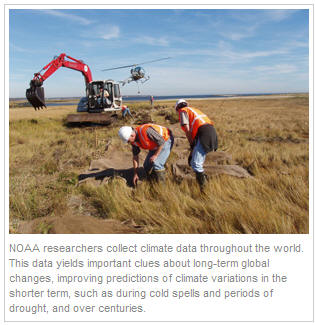
| NEWSROOM |
|
|
 |
|
|
|
|
|
|||
|
By Mike Mitchell |
||||
 |
February 11, 2010
- Individuals and decision-makers across widely diverse sectors – from
agriculture to energy to transportation increasingly are asking NOAA for
information about climate change in order to make the best choices for
their families, communities and businesses. To meet the rising tide of
these requests, U.S. Commerce Secretary Gary Locke announced the intent
to create a NOAA Climate Service line office dedicated to bringing
together the agency’s strong climate science and service delivery
capabilities.
More and more, Americans are witnessing the impacts of climate change in their own backyards, including sea-level rise, longer growing seasons, changes in river flows, increases in heavy downpours, earlier snowmelt and extended ice-free seasons in our waters. People are searching for relevant and timely information about these changes to inform decision-making about virtually all aspects of their lives. “By providing critical planning information that our businesses and our communities need, NOAA Climate Service will help tackle head-on the challenges of mitigating and adapting to climate change,” said Secretary Locke. “In the process, we'll discover new technologies, build new businesses and create new jobs.” |
|||
|
“Working closely with federal, regional, academic and other state and
local government and private sector partners, the new NOAA Climate
Service will build on our success transforming science into useable
climate services,” said Jane Lubchenco, Ph.D., under secretary of
commerce for oceans and atmosphere and NOAA administrator. “NOAA is
committed to scientific integrity and transparency; we seek to advance
science and strengthen product development and delivery through user
engagement.”
Leaders from numerous public and private sector entities support the
creation of NOAA Climate Service. “Addressing climate change is one of
our most pressing environmental challenges. Making climate science more
easily accessible to all Americans will help us gain the consensus we
need to move forward,” said Jim Rogers, CEO of Duke Energy. “The new
NOAA Climate Service is a welcome addition. It will help bring people
together so we can also bring about an economic recovery by more rapidly
modernizing our nation’s energy infrastructure.”
“NOAA has consistently led the world in climate research and observation,” said Carol Browner, assistant to the president for energy and climate change. “Businesses, communities and governments will rely even more on its expertise and the critical information it provides to make informed decisions based on the best science available. Through NOAA’s improved climate services we will be better able to confront climate change, and the many challenges it presents for our environment, security, and economy.” |
||||
|
“The establishment
of NOAA Climate Service will be an important step forward in helping the
nation better understand and forecast the changing climate. The Navy's
Task Force Climate Change looks forward to working closely with NOAA
Climate Service to ensure that both the nation and the Navy are best
prepared for the future challenges posed by climate change,” said RADM
Dave Titley, oceanographer of the Navy and director of the Navy's Task
Force Climate Change.
"NOAA's
reorganization to consolidate its formidable capabilities relating to
climate science and services in a single office is an important step
forward in the larger effort of harnessing relevant capabilities across
all the executive branch agencies to help citizens and businesses plan
for and cope with climate change," said Shere Abbott, associate director
for environment and energy at the White House Office of Science and
Technology Policy.
Unifying NOAA’s
climate capabilities under a single climate office will integrate the
agency’s climate science and services and make them more accessible to
NOAA partners and other users. Planning has been, and continues to be,
shaped by input from NOAA employees and stakeholders across the country,
with close consideration given to the recommendations of the NOAA
Science Advisory Board,
NOAA Climate
Service will encompass a core set of longstanding NOAA capabilities with
proven success. The climate research, observations, modeling,
predictions and assessments generated by NOAA’s top scientists –
including Nobel Peace Prize award-winners – will continue to provide the
scientific foundation for extensive on-the-ground climate services that
respond to millions of requests annually for data and other critical
information.
Thomas R. Karl,
director of NOAA’s
NOAA has also
unveiled a new Web site – climate.gov – that serves as a single
point-of-entry for NOAA’s extensive climate information, data, products
and services. Known as the NOAA Climate Portal, the site addresses the
needs of five broadly-defined user groups: decision makers and policy
leaders, scientists and applications-oriented data users, educators,
business users and the public.
Highlights of the
portal include an interactive “climate dashboard” that shows a range of
constantly updating climate datasets (e.g., temperature, carbon dioxide
concentration and sea level) over adjustable time scales; the new
climate science magazine ClimateWatch, featuring videos and articles of
scientists discussing recent climate research and findings; and an array
of data products and educational resources.
NOAA understands
and predicts changes in the Earth’s environment, from the depths of the
ocean to the surface of the sun, and conserves and manages our coastal
and marine resources. |
| ©AvStop
Online Magazine
Contact
Us
Return To News
|
|